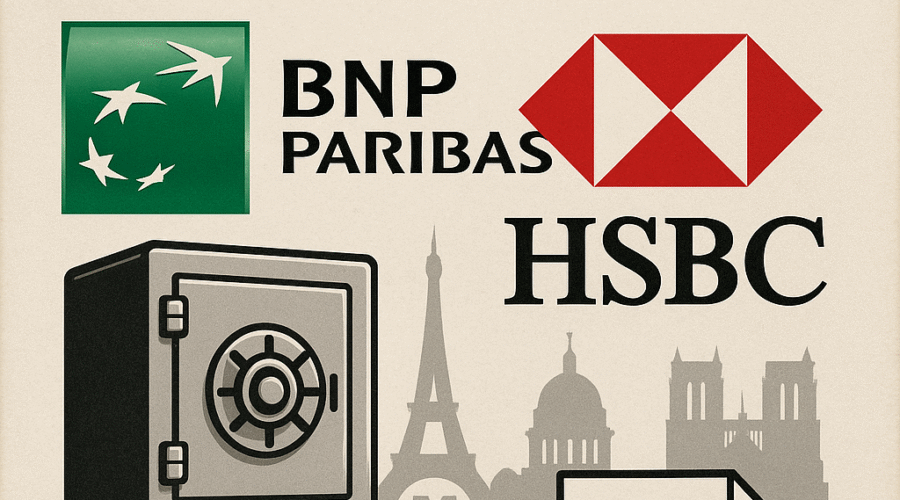In a landmark transaction announced June 27, 2025, BNP Paribas Securities Services has agreed to acquire HSBC’s custody and depositary banking operations in Germany, fundamentally altering the competitive landscape of European institutional banking. This strategic acquisition—subject to regulatory approvals—positions BNP Paribas as Germany’s second-largest custodian with €1.6 trillion in domestic assets under custody while accelerating continental consolidation trends. The phased transition beginning in early 2026 will transfer HSBC’s institutional client portfolio and specialized staff to BNP’s platform, creating a €14.3 trillion global custody powerhouse with enhanced capabilities across insurance, pension funds, and financial intermediaries. This move exemplifies how integrated banking models are capitalizing on global banks’ strategic retreats to capture high-margin, recurring revenue streams in core European markets[1][2][4][6].
💼 Seasoned CorpDev / M&A / PE expertise
Transaction Architecture and Strategic Rationale
Deal Structure and Operational Integration
The agreement involves BNP Paribas acquiring 100% of HSBC Continental Europe S.A.’s German custody and depositary banking operations through its Securities Services division. Crucially, the transaction includes the transfer of all client contracts, proprietary technology platforms, and approximately 120 specialized custody staff currently employed by HSBC in Germany[2][5][6]. Implementation will commence in early 2026 through a phased migration process designed to minimize client disruption, with BNP Paribas establishing dedicated transition teams to ensure operational continuity for institutional accounts. The structured handover reflects BNP’s “global-local” service model that combines centralized expertise with on-the-ground market knowledge—a critical advantage when integrating complex custody operations[2][4][8].
Strategic Imperatives for BNP Paribas
This acquisition directly advances three pillars of BNP Paribas’ 2025-2030 growth strategy: deepening leadership in core European markets, expanding high-margin institutional services, and capturing insurance sector opportunities. Germany represents BNP’s largest continental market outside France, with institutional assets exceeding €3.2 trillion—a pool growing at 6.2% annually through 2030 according to internal projections[4]. By absorbing HSBC’s domestic custody book, BNP immediately gains critical mass in pension fund administration and insurance servicing, sectors where it previously held subscale positions. The transaction also eliminates a mid-tier competitor while providing cross-selling opportunities for BNP’s securities lending, ESG reporting, and fund administration services—synergies projected to generate €80-100 million in incremental annual revenue within three years[4][6].
HSBC’s Strategic Retreat
HSBC’s divestiture aligns with its October 2024 “simplification strategy” to exit non-core European markets and concentrate resources on Asian wealth management and strategic hubs in London, Ireland, and Luxembourg[5]. The German custody operation—focused exclusively on domestic institutional clients—no longer fit HSBC’s global network priorities despite being profitable. This transaction follows HSBC’s earlier exits from French retail banking and Canadian operations, reflecting a broader trend of global banks retrenching to fortress markets. For HSBC, the sale releases regulatory capital for redeployment toward higher-return Asian opportunities while maintaining European presence through its Luxembourg depositary hub[5][8].
Market Structure Implications
German Custody Landscape Transformation
The acquisition reshapes Germany’s €10 trillion institutional banking market by consolidating the third and fourth-largest custodians under BNP Paribas. Post-transaction market share analysis reveals Deutsche Bank retains the top position with 31% of assets under custody, followed by BNP Paribas at 24% (up from 18%), and DekaBank at 17%[4]. This realignment creates a clear tripartite market structure where scale advantages become increasingly decisive. The transaction particularly impacts the insurance segment, where BNP gains 15 new institutional clients representing €420 billion in assets—immediately establishing market leadership in insurance custody services ahead of Deutsche Bank and State Street[4][6].
European Consolidation Accelerates
BNP’s move exemplifies the accelerating consolidation of European securities services, where scale has become essential for compliance with evolving EU regulations like the Digital Operational Resilience Act (DORA) and Sustainable Finance Disclosure Regulation (SFDR). Since 2023, custody margins have compressed by 12 basis points industry-wide due to rising technology and compliance costs, forcing sub-scale players to seek exits[4]. HSBC’s German exit follows similar retreats by Citigroup (Belgian custody, 2024) and Standard Chartered (Nordic operations, 2023), creating acquisition opportunities for pan-European players like BNP Paribas and Societe Generale. This transaction signals that Germany—Europe’s largest institutional market—is now a primary consolidation battleground[4][5].
Financial and Competitive Analysis
Valuation Metrics and Synergy Potential
While transaction terms remain undisclosed, comparable custody deals suggest a valuation range of 1.2-1.5x annual revenue. HSBC’s German custody unit generated approximately €85 million in 2024 revenue with 32% operating margins—above the European average of 28%[4][6]. BNP can immediately capture €25 million in cost synergies through platform consolidation and branch rationalization, with additional revenue synergies from cross-selling fund administration and securities lending services. The transaction’s internal rate of return (IRR) is projected at 14-16% by BNP’s strategic finance unit, exceeding the division’s 11% cost of capital[4].
Competitive Positioning Enhancement
This acquisition materially strengthens BNP’s competitive positioning against three critical dimensions: client diversification, product depth, and regulatory capacity. The addition of HSBC’s insurance clients reduces BNP’s reliance on asset manager relationships from 78% to 68% of custody revenue while creating cross-selling opportunities for corporate trust services. Technologically, BNP gains HSBC’s proprietary ESG reporting engine—a system rated “market leader” by Celent in 2024—which can be deployed across BNP’s global custody platform[4]. Most significantly, the transaction adds 40 specialized depositary banking professionals, addressing the talent scarcity that previously constrained BNP’s German growth ambitions[2][4].
Execution Considerations and Industry Impact
Regulatory and Integration Challenges
The transaction faces scrutiny from BaFin (Germany’s financial regulator) and the European Central Bank, with particular focus on depositary banking concentration risks. BNP has preemptively proposed a “depositary firewall” structure segregating client assets within its German subsidiary to address concerns. Integration risks center on migrating HSBC’s legacy systems to BNP’s proprietary architecture—a process complicated by HSBC’s use of customized SWIFT messaging protocols. BNP’s integration playbook leverages experience from its 2023 ABN AMRO custody acquisition, employing parallel-run systems during the 12-month transition to ensure zero settlement failures[2][5][8].
Broader Industry Implications
This transaction establishes a blueprint for future European custody consolidation: global players retreat to focus on core strengths while integrated continental banks acquire scale in targeted markets. For private equity firms, it highlights the attractiveness of custody businesses as “capital-light cash engines” with recession-resistant revenues—a dynamic driving increased sponsor interest in mid-tier custodians like KAS Bank and Apex Group. The deal also signals to institutional clients that scale and regulatory capability are becoming selection criteria, potentially triggering custodian reassessments by German pension funds and insurers[4][5].
Leadership Perspectives and Strategic Vision
BNP Executive Commentary
Patrick Colle, Head of Securities Services at BNP Paribas, emphasized the strategic fit: “This transaction underpins our goal to expand capabilities in targeted markets globally. Our on-the-ground expertise enables us to reinforce our role as a long-term trusted partner”[2][3]. Thorsten Gommel, Regional Head for Germany, added: “We have great ambitions in growing our German operations—this acquisition scales our expertise to provide industry-leading services”[2]. Lutz Diederichs, CEO of BNP Germany, highlighted the market uniqueness: “Our twelve business lines offer services unmatched in Germany, from Global Markets to Wealth Management”[2][8].
HSBC’s Strategic Repositioning
HSBC’s exit aligns with CEO Noel Quinn’s vision to “simplify for growth” by focusing on Asian wealth management and European hubs. The bank retains Luxembourg’s depositary hub—a €1.2 trillion operation serving cross-border funds—while redirecting German resources toward corporate banking. This transaction exemplifies HSBC’s disciplined capital reallocation, having now exited seven non-core European businesses since 2023[5][8].
Conclusion: Redefining European Custody Banking
BNP Paribas’ acquisition of HSBC’s German custody business represents a strategic inflection point in European institutional banking. By capturing €420 billion in assets and specialized depositary capabilities, BNP not only consolidates its German leadership but establishes a template for future market-driven consolidation. The transaction validates the competitive advantage of integrated banking models in delivering the scale, regulatory expertise, and local market knowledge increasingly demanded by institutional clients. As global banks continue retreating to core markets, expect further strategic acquisitions by continental players seeking to build unassailable positions in Europe’s largest financial centers. For investment professionals, this deal underscores the enduring value of custody banking’s high-margin, capital-light business model—particularly when enhanced through strategic market consolidation[1][4][6].
Sources
https://www.tradingview.com/news/reuters.com,2025:newsml_FWN3SU024:0-bnp-paribas-securities-services-business-agrees-to-acquire-hsbc-s-custody-and-depositary-bank-business-in-germany/, https://group.bnpparibas/en/press-release/bnp-paribas-expands-its-securities-services-activity-through-the-acquisition-of-hsbcs-custody-and-depositary-bank-business-in-germany, https://www.investing.com/news/stock-market-news/bnp-paribas-acquires-hsbcs-custody-business-in-germany-93CH-4114530, https://www.ainvest.com/news/bnp-paribas-seizes-german-institutional-banking-crown-hsbc-custody-acquisition-2506/, https://fxnewsgroup.com/forex-news/institutional/hsbc-continental-europe-to-sell-its-custody-business-in-germany-to-bnp-paribas/, https://www.marketscreener.com/quote/stock/BNP-PARIBAS-4618/news/BNP-Paribas-acquires-HSBC-s-activities-in-Germany-50354111/, https://www.indexbox.io/blog/bnp-paribas-to-acquire-hsbcs-custody-business-in-germany/, https://www.morningstar.co.uk/uk/news/AN_1751039789770181200/bnp-paribas-agrees-to-buy-hsbcs-german-custody-and-depositary-bank.aspx





